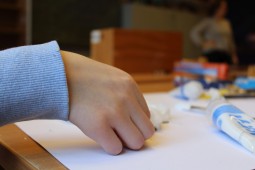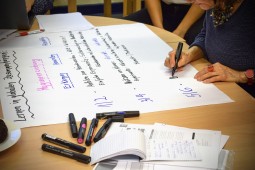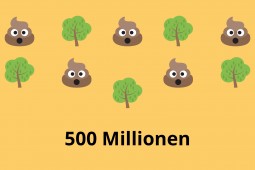Toiletised World – Teaching Materials

Why
Global topics such as the environment, health, or human rights and their interrelationships can be demonstrated using the toilet: More than 50% of the world's population live without adequate sanitation - a degrading situation with serious effects on health and the environment. The pedagogical-didactic teaching materials explore these interrelationships.
The materials include
- background information
- didactic and methodical hints
- overview of the teaching unit with its progressions
- NEW: films (introductory exercises and in-depth study) English subtitle available
- worksheets / Copy templates
Find all materials here class 3 to 6 and class 7 to 10. *German only
How did it go? Follow the link and give us your feedback! *german only.
Facts
- 25%of the world's population are affected by water shortages.
- 2billion people do not have access to clean drinking water.
- 80%of all wastewater worldwide flows untreated into lakes, rivers or the sea.
The right to water, sanitation, and health applies to everyone on earth. Schools must have safe and clean sanitation facilities, as children and young people spend most of their day there. To date, 620 million school girls do not have adequate sanitation at their schools (source).
Join us in celebrating the World Toilet Day on November 19 to raise more public and political awareness about WASH and the Sustainable Development Goals. Spread the word! It's about our future, in Germany and worldwide.
News
Education programme "Toiletised World" increases impact
With a pilot project in the second half of 2019, the German Toilet Organization e. V. (GTO) has successfully expanded the impact of its development education work for the first time by using multipliers. Teachers at schools and employees of supply and disposal companies are called upon to apply the knowledge they have learned in their work.
Online workshop for schools out now!
Our new online workshop for school classes explains why toilets are so important.
No toiltes, no action – explanatory films for the classroom
Why are toilets important? What does climate change have to do with toilets? The GTO publishes new explanatory films on sanitation for teachers and middle school students. Take a look!
Hints
Which competences do the materials promote?
The materials promote competencies of global learning such as the recognition of socio-cultural and natural diversity of the One World, a change of perspective and empathy, communication, judgement and action, as well as the ability to participate and to help shape sustainable development goals. In particular, the GTO is the only NGO in Germany to offer sanitary related materials that include concrete teaching processes for the implementation of teaching units.
How much do the materials cost?
For which age groups/grades are the teaching materials suitable?
In which subjects can the materials be used?
Is there an option for action offered in the materials?
What is Global Learning?
What is the Global Development Learning Framework?
What are the SDGs?


